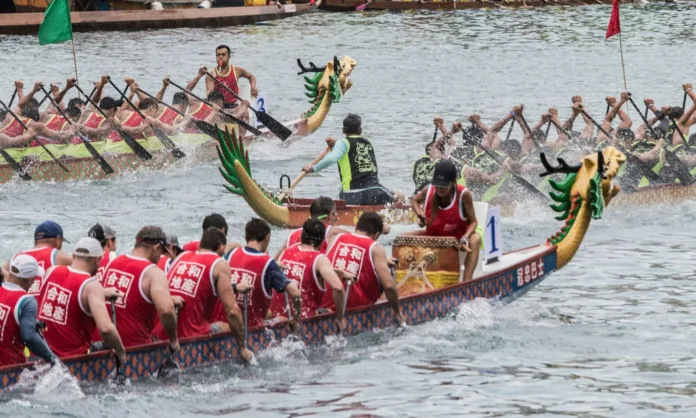People engage in festive activities across the country, highlighting cultural traditions and tourism
China celebrates the Dragon Boat Festival with a three-day holiday, drawing people to various cultural and recreational activities nationwide. Known as the Duanwu Festival, this year’s event falls on June 10, with festivities commencing on June 8. In Neijiang, Sichuan Province, tourists flock to witness the face-changing performance of Sichuan Opera, a hallmark of local culture. The dazzling show captivates audiences, showcasing the artistry and skill of performers.
In Tengzhou, Shandong Province, children delight in the water parks, enjoying the holiday in the sun. The vibrant atmosphere underscores the joy and excitement of the festival. Families and friends gather, making the most of the holiday break to bond and create lasting memories. Meanwhile, in Jingxian County, Anhui Province, visitors explore the Xuan Paper Cultural Park. The park, famous for its traditional paper-making techniques, offers an educational experience, enriching tourists’ understanding of Chinese craftsmanship.
Embed from Getty ImagesChongqing Municipality sees children visiting the Natural History Museum, engaging with interactive exhibits and learning about natural history. The museum visit provides an opportunity for educational fun, blending leisure with knowledge. In Shenyang, Liaoning Province, an aerial drone photo captures people enjoying themselves at Fantawild Adventure, an amusement park. The park buzzes with activity as families and thrill-seekers indulge in various rides and attractions, highlighting the festival’s spirit of fun and enjoyment.
Tourists in Ruoergai County, Sichuan Province, admire the scenic zigzag watercourse of the Yellow River. The picturesque view offers a tranquil escape from the bustling city life, drawing nature lovers and photographers. Meanwhile, at Luyang Lake Wetland Park in Yangzhou, Jiangsu Province, tourists row boats, embracing the serene environment. The wetland park provides a perfect setting for relaxation and nature appreciation.
In Dunhuang, Gansu Province, visitors marvel at the Mingsha Mountain and Crescent Spring scenic spot. The unique desert landscape, combined with the historic Crescent Spring, attracts tourists seeking adventure and cultural heritage. The Dragon Boat Festival, deeply rooted in Chinese tradition, commemorates the ancient poet Qu Yuan. People honour his memory through dragon boat races, traditional food like zongzi, and various cultural activities. This year, the festival highlights the rich tapestry of China’s cultural diversity and the joy of communal celebrations.
The three-day holiday significantly boosts domestic tourism, with people travelling to different parts of the country. The festival’s economic impact extends to local businesses, as tourists spend on accommodations, food, and souvenirs. The Dragon Boat Festival serves as a reminder of China’s vibrant cultural heritage, fostering unity and national pride. People from all walks of life come together to celebrate, making the holiday a cherished tradition.
Analysis:
The Dragon Boat Festival, or Duanwu Festival, has evolved into a significant cultural and economic event in China. Politically, the festival fosters national unity, celebrating shared heritage and traditions. The government supports such festivals to strengthen cultural identity and patriotism, which is crucial for social cohesion. Sociologically, the festival highlights the importance of community and familial bonds. Families participate in various activities, strengthening relationships and creating shared memories. The festival’s social function extends to community engagement, where people connect through shared cultural practices.
Economically, the festival’s impact is substantial. The three-day holiday boosts domestic tourism, with people travelling across the country. Local businesses benefit from increased spending on food, accommodations, and cultural products. This influx of tourists helps sustain local economies, particularly in regions with significant cultural attractions. The festival also promotes traditional crafts, such as Xuan paper-making in Anhui Province, supporting local artisans and preserving cultural heritage.
From a gender perspective, the festival’s activities are inclusive, engaging men, women, and children equally. However, it also highlights the role of women in maintaining cultural traditions, such as preparing traditional foods like zongzi. This aspect underscores women’s contribution to cultural preservation and family bonding. In terms of race and minority perspectives, the festival showcases China’s cultural diversity. Events in regions like Aba Tibetan-Qiang Autonomous Prefecture highlight the unique traditions of ethnic minorities, promoting cultural inclusivity and mutual respect.
Locally, the festival strengthens community ties and boosts civic pride. Cities and towns take pride in showcasing their unique cultural heritage, attracting tourists and fostering local pride. The festival’s focus on traditional activities, such as dragon boat racing and Sichuan Opera, reinforces local cultural identity and pride. The Dragon Boat Festival’s theoretical perspectives emphasize its role in cultural preservation, economic stimulation, and social cohesion. By celebrating shared traditions, the festival fosters a sense of belonging and national pride, crucial for social harmony and cultural continuity.
